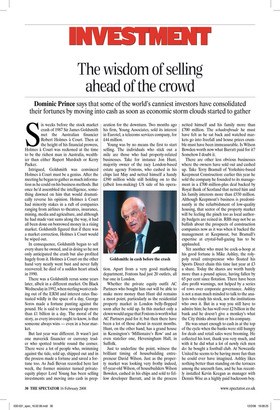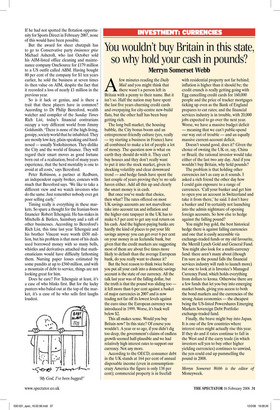The wisdom of selling ahead of the crowd
Dominic Prince says that some of the world’s canniest investors have consolidated their fortunes by moving into cash as soon as economic storm clouds started to gather Six weeks before the stock market crash of 1987 Sir James Goldsmith met the Australian financier Robert Holmes à Court. Then at the height of his financial prowess, Holmes à Court was reckoned at the time to be the richest man in Australia, wealthier than either Rupert Murdoch or Kerry Packer.
Intrigued, Goldsmith was convinced Holmes à Court must be a genius. After the meeting he began to gather as much information as he could on his business methods. But once he’d assembled the intelligence, something dawned on him that would dramatically reverse his opinion. Holmes à Court had minority stakes in a raft of companies ranging from airlines to theatres, insurance, mining, media and agriculture, and although he had made vast sums along the way, it had all been done on borrowed money in a rising market. Goldsmith figured that if there was a market correction, Holmes à Court would be wiped out.
In consequence, Goldsmith began to sell every share he owned, and in doing so he not only anticipated the crash but also profited hugely from it. Holmes à Court on the other hand very nearly went bust and never fully recovered; he died of a sudden heart attack in 1990.
There was a Goldsmith rerun some years later, albeit in a different market. On Black Wednesday in 1992, when sterling went crashing out of the ERM and interest rates fluctuated wildly in the space of a day, George Soros made a fortune punting against the pound. He is said to have scooped up more than £1 billion in a day. The moral of the story, as every investor ought to know, is that someone always wins — even in a bear market.
But last year was different. It wasn’t just one maverick financier or currency trader who spotted trouble round the corner. There were a lot of people who, swimming against the tide, sold up, shipped out and in the process made a fortune and saved a fortune too. As Judi Bevan recorded here last week, the former minister turned privateequity player Lord Young has been selling investments and moving into cash in prep aration for the downturn. Two months ago his firm, Young Associates, sold its interest in Eurotel, a telecoms services company, for £44 million.
Young was by no means the first to start selling. The individuals who stick out a mile are those who had property-related businesses. Take for instance Jon Hunt, majority owner of the racy London-based estate agency Foxtons, who cashed in his chips last May and netted himself a handy £390 million while still holding on to the (albeit loss-making) US side of his opera tion. Apart from a very good marketing department, Foxtons had just 20 outlets, all bar one in London.
Whether the private equity outfit AC Partners who bought him out will be able to make more money than Hunt did remains a moot point, particularly as the residential property market in London belly-flopped soon after he sold up. In this market only a clown would argue that Foxtons is worth what AC Partners paid for it; but then there have been a lot of those about in recent months. Hunt, on the other hand, has a grand house in Kensington’s ‘Millionaire’s Row’ and an even statelier one, Heveningham Hall, in Suffolk.
Just to underline the point, witness the brilliant timing of housebuilding entrepreneur David Wilson. Just as the property market was looking very frothy indeed, 65-year-old Wilson, of housebuilders Wilson Bowden, cashed in his chips and sold to fellow developer Barratt, and in the process netted himself and his family more than £700 million. The schadenfreude he must have felt as he sat back and watched markets go into freefall and house prices crumble must have been immeasurable. Is Wilson Bowden worth now what Barratt paid for it? Somehow I doubt it.
There are other less obvious businesses where the owners have sold out and cashed up. Take Terry Bramall of Yorkshire-based Keepmoat Construction: earlier this year he sold the company he founded to its management in a £700 million-plus deal backed by Royal Bank of Scotland that netted him and his family interests more than £550 million. Although Keepmoat’s business is predominantly in the refurbishment of low-quality housing, that sector of the property market will be feeling the pinch too as local authority budgets are reined in. RBS may not be as bullish about the prospects of construction companies now as it was when it backed the management at Keepmoat, but Bramall’s expertise at crystal-ball-gazing has to be applauded.
Yet another who must be cock-a-hoop at his good fortune is Mike Ashley, the rolypoly retail entrepreneur who floated his Sports Direct chain this time last year at £3 a share. Today the shares are worth barely more than a pound apiece, having fallen by 65 per cent since flotation. There have been dire profit warnings, not helped by a series of rows over corporate governance. Ashley is not a man much minded to talk to the analysts who study his stock, nor the institutions who own it. But in a way you still have to admire him; he has well over £2 billion in the bank and he doesn’t give a monkey’s what the City thinks about him or his company.
He was smart enough to cash in at the top of the cycle when the banks were still hungry for deals and retail sales were booming. He collected his loot, thank you very much, and with it he did what a lot of newly rich men do: he bought a football club. At Newcastle United he seems to be having more fun than he could ever have imagined. Ashley likes nothing better than standing on the terraces among the uncouth fans, and he has recently installed Kevin Keegan as manager with Dennis Wise as a highly paid backroom boy. If he had not spotted the flotation opportunity for Sports Direct in February 2007, none of this would have been possible.
But the award for sheer chutzpah has to go to Conservative party éminence grise Michael Ashcroft, who last October sold his AIM-listed office cleaning and maintenance company OneSource for £179 million to a US outfit called ABM. Having bought 80 per cent of the company for $1 ten years earlier, he sold the business at seven times its then value on AIM, despite the fact that it recorded a loss of nearly £1 million in the previous year.
So is it luck or genius, and is there a trait that these players have in common? According to Dr Philip Beresford, wealth watcher and compiler of the Sunday Times Rich List, today’s financial contrarians occupy a very different world from Jimmy Goldsmith. ‘There is none of the high-living, gossipy, society world that he inhabited. They are mostly low-key, plain-speaking and hardnosed — usually Yorkshiremen. They dislike the City and the world of finance. They will regard their smart moves as good fortune born out of a realisation, bred of many years experience, that the herd mentality is one to avoid at all costs,’ says Beresford.
Peter Robinson, a partner at Redburn, an independent equity broker, concurs with much that Beresford says. ‘We like to take a different view and we watch investors who do the same. Just remember nobody ever got poor selling early.’ Timing really is everything in these markets. So spare a thought for the Iranian-born financier Robert Tchenguiz. He has stakes in Mitchells & Butlers, Sainsbury and a raft of other businesses. According to Beresford’s Rich List, this time last year Tchenguiz and his brother Vincent were worth £850 million, but his problem is that most of his deals used borrowed money with so many bells, whistles and derivatives attached that mathematicians would have difficulty fathoming them. Nursing paper losses estimated by some pundits at up to £560 million, and with a mountain of debt to service, things are not looking great for him.
Does he care? For Tchenguiz at least, it’s a case of who blinks first. But for the lucky punters who baled out at the top of the market, it’s a case of he who sells first laughs loudest.



















































































 Previous page
Previous page